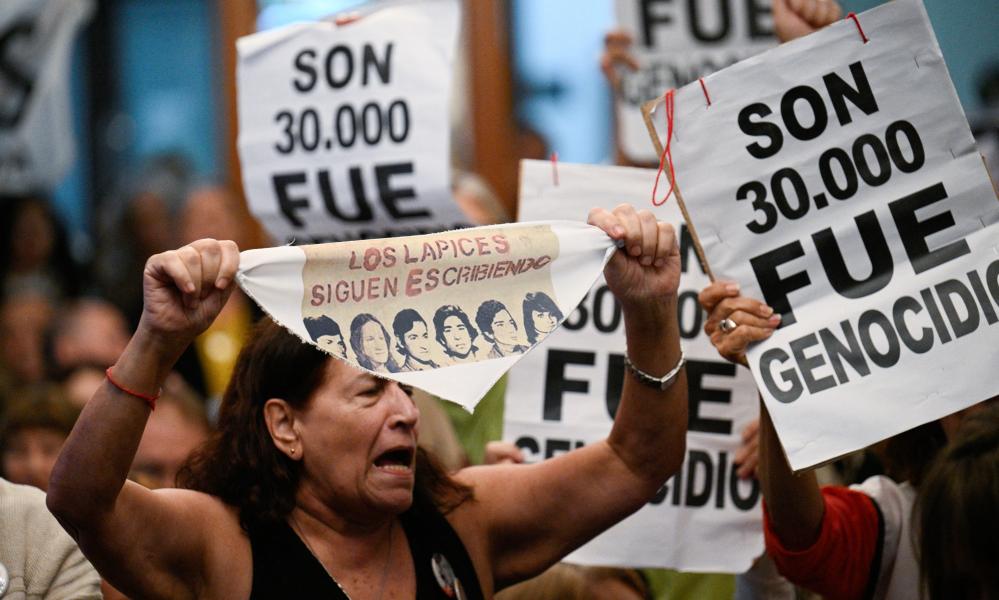The three-year case focused on the forced disappearances, torture, rapes, and homicides that occurred at or were connected to three clandestine detention and torture centres located in police investigative units on the outskirts of Buenos Aires. They were known as the Banfield pit, the Quilmes pit and “El Infierno” – or “hell” – by the officials who worked there.
The verdict was delivered on Tuesday to a packed courtroom in the city of La Plata, about 60 kilometres from the capital. There were 605 victims, among them high-school students, young pregnant women who gave birth in captivity, and their newborns who were taken from them and never returned.
Many of the women themselves remain disappeared. The case was also the first time in more than 300 dictatorship-related trials that a court heard from trans women who had been held captive, tortured, sexually abused and subjected to forced labour at the detention centres.
Related: ‘It was hell’: trans women testify on Argentina’s secret prisons of the past
The panel of three judges pronounced the acts as crimes against humanity, with the president of the panel, Ricardo Basílico, stating: “These acts, in addition to being crimes against humanity, were committed within the framework of a genocide.”
The convicted officials watched the verdict via video link from their couches or seated at tables in their homes, where they have been serving house arrest. Ten of the accused received life sentences, one received a sentence of 25 years, and one was absolved.
“It’s very important,” said Ana Oberlin, one of the prosecutors in the case, of the verdict, saying: “It’s the first time, not just in Argentina, but the world, that we address the violence [trans women] suffered during state terrorism.”
The court heard directly from a group of five trans women in April of last year, including Paola Alagastino who testified: “It was hell, what we lived through in there.”
The case also looked at the sexual crimes suffered by cis women who were in captivity, and a forced abortion.
Argentina has been celebrated around the world for its efforts to seek justice for victims of atrocities committed by the military dictatorship between 1976 and 1983. Since 2006, more than 1,100 people have been convicted in trials that span the length of the country.
But the current government of President Javier Milei has sought to pierce the social consensus built around what occurred during that period, in particular by minimizing the atrocities of the dictatorship.
On Sunday, as a massive march to mark the 48th anniversary of the coup filled the core of Buenos Aires, his government released a video disputing once again the estimation used by human rights groups of 30,000 disappeared people.
Related: ‘Justification of dictatorship’: outcry as Milei rewrites Argentina’s history
The figure is based on several estimations, including one made by the military itself in declassified documents in which it claimed to have disappeared or killed close to 22,000 people between 1975 and 1978, five years before the dictatorship fell.
Oberlin said the trial showed just how much is still unknown about what happened during that violent period. In addition to the experiences of trans women, it revealed the names of five disappeared people who had not yet been identified, along with testimony about a captive woman whose pregnancy had been previously unknown.
“We’re still finding out about new cases that we didn’t know anything about,” said Oberlin. “Even if it was only one person, what happened is just horrible.”
For Julieta González, one of the trans women who passed through the Banfield detention centre, and who testified during the court case about squalid conditions, sexual abuse and hearing the birth of a baby, the verdict prompted mixed feelings.
“Slow justice is not justice,” she said.
Of the convicted officials, she said: “Forty-eight years have already gone by. Such a major trial, and they didn’t even flinch.
“I’m not sure if justice was done. But now it’s in the memory of Argentines, so that this never happens again – not here, or anywhere else in the world.”
